The urgency of what’s happening to our food supply has motivated two key organic organisations to join forces. To counter industrial-style factory farming and food production, which is causing environmental degradation and ill health, Soil & Health and BioGro are working together to offer clean, green organic solutions.
The Soil & Health Association (publisher of OrganicNZ magazine)1 and BioGro Society (owner of the BioGro organic certification company)2 are discussing a merger, following the approval by both memberships in July 2015 to explore a variety of options. Both organisations are well established in their own right, and are taking the opportunity to join their expertise and resources and work together to enliven the organic sector.
“New Zealand needs live up to its clean, green image. We urgently need to shift towards high-value, safe, sustainable, GE-free organic farming, for the sake of our health, economy and environment,” said Marion Thomson, co-chair of Soil & Health.
“Organic food and farming can play a major role in countering rising health problems like cancer, allergies, diabetes and obesity,” Ms Thomson said.
“There is a big future for organics in New Zealand, and a strengthened and unified organic sector will highlight our successes and take a leadership role in sharing the solutions to current problems,” says Gaz Ingram, chair of BioGro Society.
“With changing weather patterns, we need robust and sustainable ways of producing food and fibre,” Mr Ingram said.
As consumers increasingly demand clean, safe, GE-free, organic, ethical food and other products, there is a growing need for a strong, unified organic sector that can represent and advocate for consumers and producers alike.
The joint initiative is an exciting opportunity to combine forces and unite the two organisations, whose values and goals are very closely aligned.
A working party which includes members from Soil & Health’s National Council and BioGro Society’s board is developing a strategic direction that will see a refreshed and united organisation that will capture the strengths, skills and resources of both organisations. A plan will go out to all members around March 2016. Members will vote at the AGMs of both organisations in July 2016.
NOTES
1. The Soil & Health Association is the largest membership organisation supporting organic food and farming in New Zealand. In 2016 it celebrates its 75th anniversary. Soil & Health was founded in 1941 as the Humic Compost Club by New Zealanders who were concerned about degraded soils, increasing refined foods, and the links of both of these with declining nutrition.
It promotes sustainable agricultural practices and principles of good health based on sound nutrition and the motto ‘Healthy soil – healthy food – healthy people’.
www.organicnz.org.nz
2. The BioGro Society was formed in 1983 by Soil & Health, the Biodynamic Association and the Henry Doubleday Research Association, who saw the need for a credible and internationally respected organic standard and certification process, in order to safeguard the interests of producers and consumers.
The BioGro company (owned by the BioGro Society) is the premier organic certification agency in New Zealand. It certifies and accredits over 600 producers in New Zealand and the Pacific, is accredited to IFOAM (International Federation of Organic Agriculture Movements) and has an excellent reputation with domestic and export markets.
www.biogro.co.nz
Project Gro 2015 – ORMISTON PRIMARY SCHOOL
/in Campaigns, Project GroWe used the Project Gro funds to put in raised beds and get our Community Garden off the ground.
Here is a photo of the project and we also have a video of the learners building it.
[columns] [span4]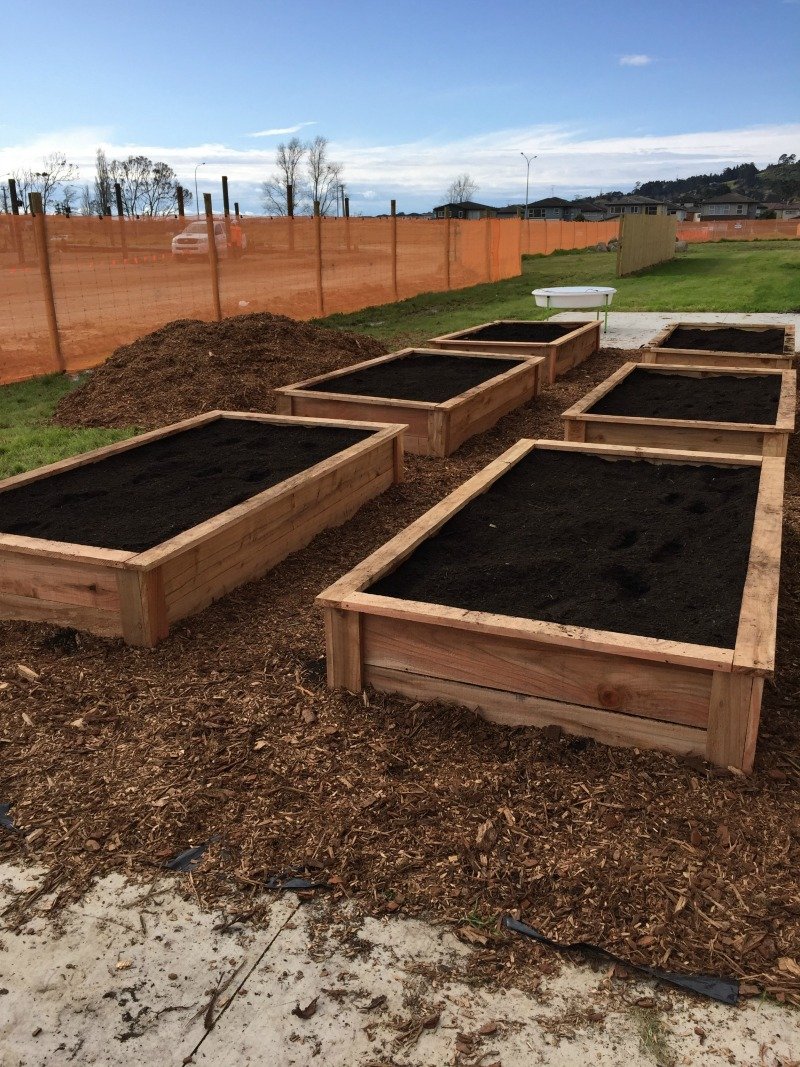
[/span4][span4][/span4][span4][/span4][/columns]
Project Gro 2015 – BANK STREET COMMUNITY GARDEN, WHANGAREI
/in Campaigns, Project GroSoil & Health’s Project Gro funding enabled us to hook up a rainwater collection system to water the garden. We have turned a derelict block into a functioning garden, supplying food for us as well as for insects and the odd pukeko who likes to spread our nicely piled up compost around the garden.
We have working examples of different types of composts, companion planting and raised beds. We wanted a place for people to sit and rest and enjoy and see that gardening doesn’t have to cost lots of money. People now respect the place and we’ve had no incidents of damage or vandalism, just the odd beer bottle left lying around. Good to know that people are enjoying the place!
Monique Portegys – Manager, Community Business and Environment Centre at Bank Street Community Garden
[columns] [span4]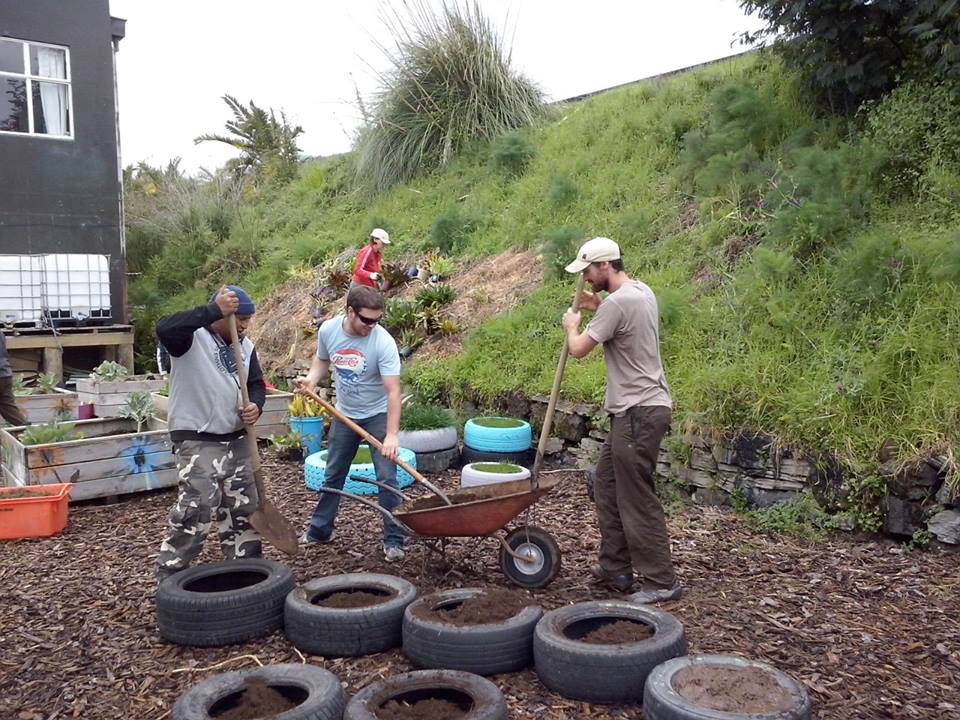

[/span4][span4]
[/span4][span4][/span4][/columns]
Project Gro 2015 – ST JOSEPH’S CATHOLIC SCHOOL IN RANGIORA
/in Campaigns, Project GroOur project was to erect six raised-bed planter boxes in the school grounds.
Students had shown a keen interest in gardening and had a vegetable plot for several years in the backyard of the presbytery next door to the school. This worked well but was not ideal; it was difficult to supervise groups of students and it was inaccessible to other students who were not directly involved. The parish priest at the time, Father Dan Doyle, was wonderful and supported the initiative fully, bringing the gardeners refreshments, inquiring about their progress, and watering the gardens over the holidays. Students grew their produce from seed and harvested seed at the end of the season for the following year. The Southland Building Society also donated seeds each year. The produce was shared amongst various groups, students, parishioners and school families.
With the help of the Soil & Health’s Project Gro funding we purchased the wood to build planter boxes, which were made by a group of school parents. Bennetts Sawmill provided the macrocarpa at a very competitive price and Rangiora Landscape and Supplies donated the soil.
Each class was allocated their own planter box and decided what they wanted to plant. There wasn’t much planning; we just wanted to get the students interested and involved in all stages of the process and to have crops that matured quickly and to include some that could be picked and eaten directly from the garden.
A roster was made for the Christmas holidays and a few dedicated families ensured the beds were regularly watered. The gardens absolutely flourished and are still yielding much produce. We have grown beans, broccoli, cabbage, cauliflower, silverbeet, lettuce, potatoes, tomatoes, radishes, beetroot, cucumbers and capsicums. Marigolds were placed in some beds to ward off bugs, and no sprays or insecticides have been used. Students regularly visit the gardens with their class or during breaks and are encouraged to pick any ripe vegetables. Produce has been shared amongst students and staff and school families are welcome to help themselves too.
The next step is to look more closely at planting for a purpose, selecting plants that are suited to the growing environment, companion planting, natural ways to control pests, irrigation, ways to increase yield and investigate how to make the best use of the produce (e.g. donate to the parish food basket for families suffering hardship, do some preserving for the school fair etc.) It would also be great to be part of a seed exchange programme. Hopefully some of these ideas will be taken up by classes wanting to develop further this great kinaesthetic learning opportunity.
[columns] [span4]

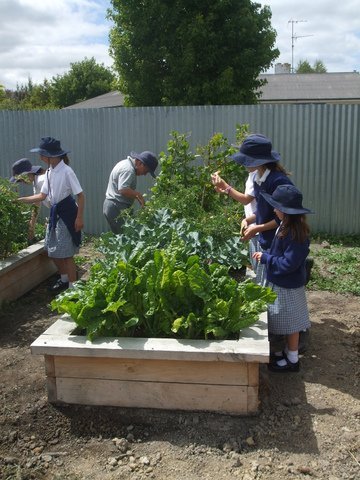 [/span4][/columns]
[/span4][/columns]
[/span4][span4]
[/span4][span4]
Project Gro 2015 – DELTA COMMUNITY TRUST
/in Campaigns, Project GroThank you for your 2014 grant of $450, plus subscription to your magazine.
This has enabled the construction of 4 transportable compost bins. As you can see from the photo these are in active use in our garden and have contributed to its success over the last year, and will continue to do so into the future.
This garden enables the teaching of gardening skills to 15+ low income and disadvantaged individuals, as well as supplying our food bank and low cost community meal with 30+ apple crates of produce annually.
Thank you for making this work possible.
Yours Sincerely,
Ian Burn – Administration Services Co-ordinator
[columns] [span4]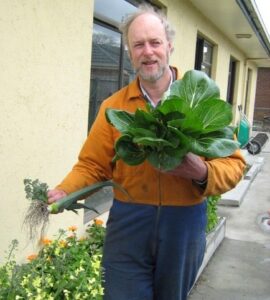
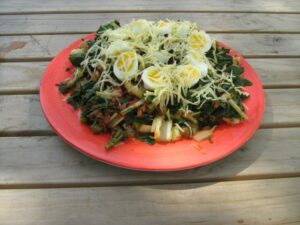
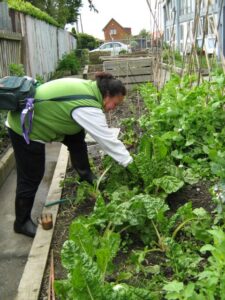 [/span4][/columns]
[/span4][/columns]
[/span4][span4]
[/span4][span4]
Joining forces to clean up food and farming
/in Farming, Food, Media ReleasesThe urgency of what’s happening to our food supply has motivated two key organic organisations to join forces. To counter industrial-style factory farming and food production, which is causing environmental degradation and ill health, Soil & Health and BioGro are working together to offer clean, green organic solutions.
The Soil & Health Association (publisher of OrganicNZ magazine)1 and BioGro Society (owner of the BioGro organic certification company)2 are discussing a merger, following the approval by both memberships in July 2015 to explore a variety of options. Both organisations are well established in their own right, and are taking the opportunity to join their expertise and resources and work together to enliven the organic sector.
“New Zealand needs live up to its clean, green image. We urgently need to shift towards high-value, safe, sustainable, GE-free organic farming, for the sake of our health, economy and environment,” said Marion Thomson, co-chair of Soil & Health.
“Organic food and farming can play a major role in countering rising health problems like cancer, allergies, diabetes and obesity,” Ms Thomson said.
“There is a big future for organics in New Zealand, and a strengthened and unified organic sector will highlight our successes and take a leadership role in sharing the solutions to current problems,” says Gaz Ingram, chair of BioGro Society.
“With changing weather patterns, we need robust and sustainable ways of producing food and fibre,” Mr Ingram said.
As consumers increasingly demand clean, safe, GE-free, organic, ethical food and other products, there is a growing need for a strong, unified organic sector that can represent and advocate for consumers and producers alike.
The joint initiative is an exciting opportunity to combine forces and unite the two organisations, whose values and goals are very closely aligned.
A working party which includes members from Soil & Health’s National Council and BioGro Society’s board is developing a strategic direction that will see a refreshed and united organisation that will capture the strengths, skills and resources of both organisations. A plan will go out to all members around March 2016. Members will vote at the AGMs of both organisations in July 2016.
NOTES
1. The Soil & Health Association is the largest membership organisation supporting organic food and farming in New Zealand. In 2016 it celebrates its 75th anniversary. Soil & Health was founded in 1941 as the Humic Compost Club by New Zealanders who were concerned about degraded soils, increasing refined foods, and the links of both of these with declining nutrition.
It promotes sustainable agricultural practices and principles of good health based on sound nutrition and the motto ‘Healthy soil – healthy food – healthy people’.
www.organicnz.org.nz
2. The BioGro Society was formed in 1983 by Soil & Health, the Biodynamic Association and the Henry Doubleday Research Association, who saw the need for a credible and internationally respected organic standard and certification process, in order to safeguard the interests of producers and consumers.
The BioGro company (owned by the BioGro Society) is the premier organic certification agency in New Zealand. It certifies and accredits over 600 producers in New Zealand and the Pacific, is accredited to IFOAM (International Federation of Organic Agriculture Movements) and has an excellent reputation with domestic and export markets.
www.biogro.co.nz
Climate-friendly farming: we have the solutions
/in Farming, Media ReleasesWe have good news for John Key! At the climate talks in Paris, Prime Minister John Key said that cost-effective technologies for reducing New Zealand’s agricultural emissions were not yet available.
However, according to the Soil & Health Association, not only do we already have the technology and the know-how to reduce greenhouse gas emissions from agriculture, but using this technology will also have multiple other benefits for our economy, our environment, our soils and waterways, and our health.
“We already have low-emission climate-friendly farming practices – it’s called organic farming,” said Marion Thomson, co-chair of Soil & Health.
Because nearly 50% of New Zealand’s greenhouse gas emissions come from farming, we cannot continue to ignore this. By moving towards organic and biological farming, we will reduce carbon, methane and nitrous oxide emissions.
“Soil & Health is calling on the government to reinvest the taxpayer money going to the Global Research Alliance on Agricultural Greenhouse Gases, and instead use it to help farmers transition to organic practices,” said Thomson.
“The $20 million Mr Key just promised to the Alliance would be infinitely more effectively invested in growing the organic farming sector. Helping farmers transition to eco-friendly, climate-friendly organic farming will be good for our health, wealth and environment. What’s not to like about that?” asked Thomson.
The organic approach ticks all the right boxes. By farming organically, farmers can reduce stock numbers and still get the same income, because global markets are crying out for clean, green, pasture-fed, GE-free and organic food, and are prepared to pay a premium for it.
Lower stock numbers mean lower greenhouse gas emissions, as well as reducing the impacts on soils and waterways, which desperately need to be cleaned up.
Mixed pasture species including those with high tannins like birdsfoot trefoil can be grown to reduce methane emissions from ruminant animals.
In addition, organic farms have better soil structures and better soil moisture-holding capacity, which will help farmers cope with the effects of climate change that we are seeing already. Organic farms are more resilient in the face of floods and droughts.
Non-organic farms generally use pesticides that are either known or suspected carcinogens, so going organic will also reduce the nation’s health bill by reducing or eliminating the use of harmful chemicals.
MEDIA CONTACT:
Marion Thomson, co-chair, Soil & Health
027 555 4014
GE animal experiments: expensive, unethical failures
/in GE, GM, Media ReleasesExperiments to genetically engineer animals in New Zealand over the past 15 years have proven to be expensive and unethical failures, says the Soil & Health Association, and must be stopped. Soil & Health commends GE Free NZ’s report ‘GE Animals in New Zealand’ for providing a clear overview of animal genetic engineering research in Aotearoa using sheep, cattle, and goats.
“The suffering that hundreds of animals have endured is totally unacceptable and goes way beyond the guidelines of the Royal Society for the Prevention of Cruelty to Animals,” said Marion Thomson, co-chair of Soil & Health. “This report catalogues all the documented deaths, deformities, abortions, sterility and numerous other health problems that the GE research animals have been subjected to.”
“We can’t afford to waste any more taxpayer money on these unethical experiments that have failed to produce any medical benefit,” said Thomson. “Instead we need to redeploy the skills of AgResearch scientists into sustainable and ethical research, such as into organic practices, that will benefit our farming, environment and health.”
The GE animal experiments have been completely unnecessary, as they have used animals as ‘bioreactors’ to produce therapeutic substances that are already available in other forms, says Soil & Health.
One point highlighted in GE Free NZ’s report is the fact that AgResearch has refused to release photographs of the animals involved in the experiments. “If these photos were released, people could see for themselves the needless suffering experienced by these animals,” said Thomson.
Together with Soil & Health’s promotion of healthy organic food and farming, the Association supports high standards of animal welfare, based on the ‘five freedoms’ that have been adopted by many organisations around the world.
Childhood obesity plan a fat lot of good
/in Health, Media ReleasesThe government’s Childhood Obesity Plan doesn’t go nearly far enough to address the alarming increase in childhood obesity, according to the Soil & Health Association.
“There are some commendable actions in this plan, but the rise of obesity in children is serious and we need much bolder action to prevent major costs to the health system and to society,” says Marion Thomson, co-chair of Soil & Health.
“Diet is a major part of the problem. We need nutrition education for children and adults, and need to promote healthy food choices in a variety of ways,” says Thomson.
“We would like to see more healthy food options available in schools, and the removal of junk food, including sugar-laden fizzy drinks and diet drinks – neither of these are healthy options. Instead we recommend that good quality pure water should be promoted and readily available in schools.”
“Soil & Health supports a tax on sugary drinks, echoing the World Health Organization’s Commission on Ending Childhood Obesity in their draft report,” says Thomson. “More evidence of the effectiveness of a sugar tax will become available as more countries implement such taxes.”
The government’s Childhood Obesity Plan acknowledges that ‘children’s food choices and requests are strongly influenced by advertising’, but leaves it to the Advertising Standards Authority to review their Code for Advertising to Children and the Children’s Code for Advertising Food.
“We should not be leaving this to industry. We ask the government to take strong leadership on this and legislate or regulate to restrict the advertising and marketing of unhealthy food to children,” says Thomson.
For nearly 75 years Soil & Health has promoted safe, natural, unprocessed organic food. Through the magazine Organic NZ the Association educates people about healthy food, healthy soil and healthy lifestyle choices.
MEDIA CONTACT
Marion Thomson,
Co-chair, Soil & Health Association of NZ
References
· NZ Government’s Childhood Obesity Plan:
http://www.health.govt.nz/our-work/diseases-and-conditions/obesity/childhood-obesity-plan
· World Health Organization Draft Final Report of the Commission on Ending Childhood Obesity:
http://www.who.int/end-childhood-obesity/commission-ending-childhood-obesity-draft-final-report-en.pdf?ua=1
Celebrating NZ’s first official GE-free food producing region
/in Food, GE, GM, Media ReleasesHastings District Council’s decision to ban GE in their district is welcome news, says the Soil & Health Association. The just-released Hastings District Plan prohibits the release and field trialling of genetically engineered organisms, creating the first official GE-free food-producing region in New Zealand, and joining a number of regions around the world.1
“With a regional economy that relies on high-quality horticulture and agriculture and New Zealand’s clean green image, this decision makes sound business sense,” says Marion Thomson, co-chair of Soil & Health.
Retaining and strengthening the district’s valuable GE-free status is important for export and local food production. There is a strong and increasing demand for high-value, safe, GE-free food, and customers are paying a premium for it.
“The Council has acted on the wishes of 85% of the community,” says Thomson, “and the leadership shown by primary producer group Pure Hawke’s Bay has been absolutely brilliant.”
Soil & Health’s submission to the Council, in support of a GE-free district, drew attention to the 340-plus certified organic producers in the wider Hawke’s Bay. Organic producers would lose their certification if contaminated by GE organisms.
Soil & Health has made submissions to several councils around New Zealand in support of GE-free districts and regions. The Association has also invested significant amounts of money from members’ donations and participated in two landmark Environment Court cases.
One of the most significant Environment Court cases of 2015 was one in which Soil & Health and GE Free Northland led a group of section 274 (interested) parties in supporting Northland Regional Council’s precautionary wording on genetic engineering. Principal Environment Court Judge Newhook confirmed that there is jurisdiction under the RMA for regional councils to make provision for GMOs through regional policy statements and plans. [2]
This decision by the Environment Court was pivotal in the final decision made by the Hastings District Council. Soil & Health is supporting many communities around New Zealand – including Auckland Council, Bay of Plenty Regional Council, Whangarei District Council, Northland Regional Council, and Far North District Council – strengthening their GE-free status via district or regional plans.
“The GE-free movement is strong and growing, and community-led, similar to the nuclear-free movement of the 80s,” says Thomson. “New Zealand’s national legislation is inadequate to properly protect communities from the potential adverse effects of GE, so communities are acting to reinforce their existing GE-free status.”
CONTACT
Marion Thomson, co-chair, Soil & Health Association of NZ
027 555 4014
References
Links accessed Sept 2015
1. https://www.hastingsdc.govt.nz/files/all/Proposed%20DP/Plan%20Text/29.1HazardousSubstancesAndGeneticallyModifiedOrganismsDistrictWideActivity.pdf
2. http://www.organicnz.org.nz/node/1020
Notes
The Soil & Health Association of NZ is the largest membership organisation supporting organic food and farming in New Zealand, and one of the oldest organic organisations in the world, established in 1941. Our aims are to empower people and communities to grow, buy and support locally based sustainable, safe, GE-free and organic food in Aotearoa New Zealand. Soil & Health’s flagship magazine is Organic NZ, produced 6 times per year and sold nationwide.
Maize spill shows risks of GE seed escape
/in Farming, Food, GE, GM, Media ReleasesNew Zealand’s valuable GE-free status is under threat from biosecurity breaches, says the Soil & Health Association. Two spills in New Plymouth last week of maize imported from the USA show how it’s possible for genetically engineered seed to escape containment – and potentially grow.
“Well over 80% of maize grown in the US is genetically engineered, so there is a high likelihood of this seed being GE,” says Marion Thomson, co-chair of Soil & Health. “MPI has claimed that the maize is not GE, but we want to see the documentation, such as certification and test results, to be assured of this.”
New Zealand imports hundreds of thousands of tonnes of seed to be milled for stock feed. Much of it, including maize/corn, soy, canola and cottonseed, comes from countries where these GE crops are widespread.
“Have there been other spills of viable GE seed that we don’t know about?” asks Thomson. “The longer we continue to import this seed, the greater the risks are from contamination, and reputation to New Zealand’s clean, green image and primary exports – including GE-free maize.”
“New Zealand needs to be more self-sufficient and grow more of our own maize,” says Thomson. “Especially in terms of pastoral and dairy farming we need to focus on healthy, biodiverse pastures and reduce our dependence on external inputs.”
Soil & Health agrees with the majority of Kiwis that New Zealand should be GE-free in our food and environment. This is part of a healthy lifestyle, environment and economy based on sustainable, organic farming and growing.
CONTACTS
Marion Thomson,
Co-chair, Soil & Health Association of NZ
027 555 4014